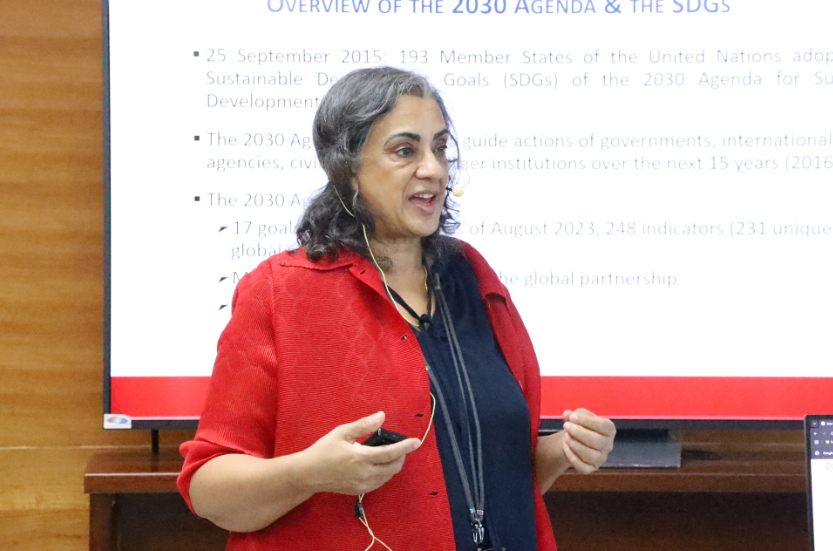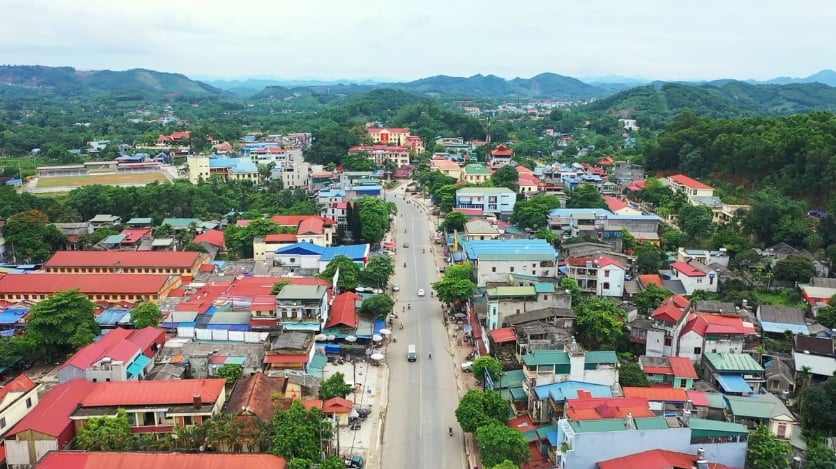December 1, 2025 | 11:39 GMT +7
December 1, 2025 | 11:39 GMT +7
Hotline: 0913.378.918
December 1, 2025 | 11:39 GMT +7
Hotline: 0913.378.918
From April 8 to 11, the National Statistics Office of Vietnam, in collaboration with the Food and Agriculture Organization of the United Nations (FAO), held a training workshop in Hanoi titled “Sampling Techniques for the 2025 Agricultural and Rural Census.” This training is part of a technical assistance project funded by FAO to support Vietnam in preparing for its upcoming nationwide agricultural and rural census in 2025.
According to Ms. Sangita Dubey, FAO Regional Statistician for Asia-Pacific, surveying is a crucial step that directly affects the quality and reliability of census results. Therefore, it is essential to apply a scientific and systematic approach to sampling in order to collect accurate data that can effectively inform the analysis and planning of rural and agricultural development policies.

Ms. Sangita Dubey, FAO Regional Statistician for Asia and Pacific. Photo: Phuong Linh.
“This training helps statistical officers master the two-stage sampling technique - a method widely used in international surveys that ensures high representativeness and precision. It also enhances the ability to analyze specific population groups and accurately reflect the current state of rural and agricultural development,” Ms. Dubey stated. “FAO remains committed to continuing its technical support for Vietnam throughout the preparation and implementation of the 2025 census.”
Through this workshop, Vietnam aims to strengthen its institutional and technical capacity in organizing agricultural censuses that meet international standards. Additionally, it seeks to ensure the sustainable use of census data in policy development and in achieving the Sustainable Development Goals (SDGs).
Standardizing sampling techniques for agricultural and rural surveys

Rural Vietnam has been undergoing a transformation toward greater modernity and sophistication. Photo: Nongnghiep.vn.
The 2025 Agricultural and Rural Census will be conducted nationwide and will combine both a complete enumeration and a sample survey approach. It will target a wide range of entities currently engaged in agriculture, forestry, and fisheries, including individual households, farms, enterprises, cooperatives, and commune-level People’s Committees. This dual approach is designed to ensure the collection of both comprehensive and representative data across various levels of production and governance in the rural and agricultural sectors.
In addition to the general survey, an in-depth sample survey will be conducted on a subset of agricultural, forestry, and fishery production households. This component is intended to gather more detailed, nuanced data that can support targeted research and the formulation of more specialized, evidence-based policies for the sector.
According to the plan, the results of the census will not only fulfill national statistical indicator requirements, but will also be aligned with international standards for comparison. Furthermore, the findings will provide a critical foundation for the development of a large-scale agricultural and rural database, which will serve long-term management, policymaking, and sectoral development efforts. This database is expected to become a valuable resource for enhancing Vietnam’s capacity to plan, monitor, and evaluate agricultural and rural development in a systematic and sustainable way.
“The organization of this training workshop on sampling methods is a concrete and practical step that enables local statistical staff to master the methodology and prepare effectively for the upcoming data collection phase,” a representative of the General Statistics Office emphasized. “With continued support from FAO and international experts, Vietnam’s General Statistics Office is gradually enhancing its capacity to conduct a modern, well-structured, and efficient nationwide census.”
The 2025 Agricultural and Rural Census is one of the most extensive and significant statistical undertakings in Vietnam, playing a crucial role in setting the direction for agricultural and rural development in the years ahead. By providing a comprehensive and up-to-date picture of rural and agricultural conditions nationwide, the census will enable the Vietnamese Government to thoroughly evaluate the effectiveness of rural development programs that have been implemented. In turn, it will serve as a vital foundation for designing more informed, responsive, and sustainable policies that better address the realities and needs of rural communities across the country.
The four-day training workshop, held from April 8 to 11, focused on the following key topics:
April 8: Introduction to sampling methodologies; presentations on Vietnam’s 2025 Agricultural and Rural Census; and an overview of follow-up sample surveys to be conducted after the census.
April 9: Presentations on principles and advanced sampling techniques; review of sampling requirements for Vietnam’s post-census sample surveys.
April 10: Guidance on testing data reliability and evaluating survey result quality; introduction to the selection and use of sampling frames for agricultural surveys, including Vietnam’s sampling frame.
April 11: Proposals for developing the sampling frame, sampling strategies, and a preliminary sample design tailored for Vietnam.
In addition to the presentations, the workshop featured hands-on exercises and discussion sessions, enabling participants to exchange ideas and collaboratively determine appropriate directions for developing sampling frameworks and strategies suited to Vietnam’s agricultural and rural context.
Translated by Hong Ngoc

(VAN) The Institute of Agricultural Sciences for Southern Vietnam (IAS) marked its 100th anniversary in Ho Chi Minh City, celebrating a century of growth as a leading institute contributing significantly to Viet Nam’s agricultural development.

(VAN) An increasing number of livestock farms are using biogas generators to create a source of renewable electricity, helping to save costs and mitigate environmental pollution.

(VAN) Small changes in rice cultivation, from irrigation methods and straw collection to input management, are paving a new way for Vietnam's agriculture in the journey toward emission reduction.

(VAN) With the project of converting biogas into renewable electricity, Australia is both helping pig farms reduce their energy costs by up to 25% and contributing to environmental protection.
![Hue aims for Net Zero: [1] Initial steps from green transportation](https://t.ex-cdn.com/nongnghiepmoitruong.vn/608w/files/huytd/2025/11/28/0853-anh-6-giao-thong-xanh-hue-094717_940-153724.jpg)
(VAN) For sustainable development, Hue City is implementing many solutions to promote green transportation, which is an important initial step on the journey to building a Net Zero Hue.

(VAN) Nghe An Province, one of the localities with the largest forest area in Vietnam, is set to gain significant benefits from the implementation of forest carbon credit payments.

(VAN) Circular agriculture helps Mekong Delta farmers cut greenhouse gas emissions while boosting incomes through efficient reuse of agricultural by-products.